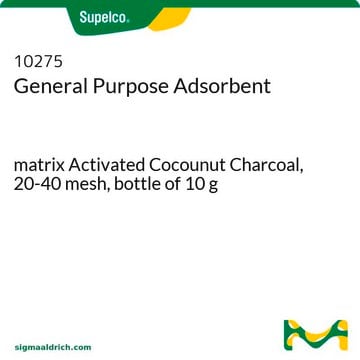05112
Activated charcoal
suitable for GC
Synonym(s):
Charcoal activated
Sign Into View Organizational & Contract Pricing
All Photos(1)
About This Item
Empirical Formula (Hill Notation):
C
CAS Number:
Molecular Weight:
12.01
EC Number:
MDL number:
UNSPSC Code:
23201100
PubChem Substance ID:
NACRES:
SB.54
Recommended Products
vapor pressure
<0.1 mmHg ( 20 °C)
Quality Level
form
granular
autoignition temp.
842 °F
resistivity
1375 μΩ-cm, 20°C (graphite)
technique(s)
LPLC: suitable
gas chromatography (GC): suitable
matrix
Carbon
matrix active group
carbon
particle size
0.3-0.5 mm
mp
3550 °C (lit.)
bulk density
0.4‑0.5 g/cm3
separation technique
reversed phase
SMILES string
[C]
InChI
1S/C
InChI key
OKTJSMMVPCPJKN-UHFFFAOYSA-N
Looking for similar products? Visit Product Comparison Guide
General description
Activated charcoal or activated carbon is nontoxic in nature and is used as an adsorbent to remove broad spectrum of pollutants in air, water and soil. It does not lose potency when kept in container. It has no odour or taste. It can be prepared from any carboneous material using chemical or gas activation methods. Gas activation is preferred when the raw material has less than 25% moisture content.
Application
It may be used for fiber coating multiwalled carbon nanotubes to compare its solid-phase microextraction efficiency in water and milk samples before GC-ECD analysis.
Storage Class Code
11 - Combustible Solids
WGK
WGK 3
Flash Point(F)
Not applicable
Flash Point(C)
Not applicable
Personal Protective Equipment
dust mask type N95 (US), Eyeshields, Gloves
Choose from one of the most recent versions:
Already Own This Product?
Find documentation for the products that you have recently purchased in the Document Library.
Customers Also Viewed
David O. Cooney
Activated Charcoal: Antidote, Remedy and Health Aid, 102-102 (2016)
Activated charcoal; preparation, characterization and applications: a review article.
Mohammad-Khah, A., and R. Ansari.
International Journal of ChemTech Research, 1, 2745-2788 (2009)
Multiwalled carbon nanotubes coated fibers for solid-phase microextraction of polybrominated diphenyl ethers in water and milk samples before gas chromatography with electron-capture detection.
Wang, Jun-Xia, et al
Journal of Chromatography A, 1137.1, 8-14 (2006)
Yin Wang et al.
Proceedings of the National Academy of Sciences of the United States of America, 111(1), 533-538 (2013-12-25)
Stomatal pores surrounded by a pair of guard cells in the plant epidermis control gas exchange between plants and the atmosphere in response to light, CO2, and the plant hormone abscisic acid. Light-induced stomatal opening is mediated by at least
Kohsuke Ohmatsu et al.
Nature chemistry, 6(1), 47-51 (2013-12-19)
The development of a general catalytic method for the direct and stereoselective construction of contiguous all-carbon quaternary stereocentres remains a formidable challenge in chemical synthesis. Here, we report a highly enantio- and diastereoselective [3+2] annulation reaction of 5-vinyloxazolidinones and activated
Our team of scientists has experience in all areas of research including Life Science, Material Science, Chemical Synthesis, Chromatography, Analytical and many others.
Contact Technical Service




